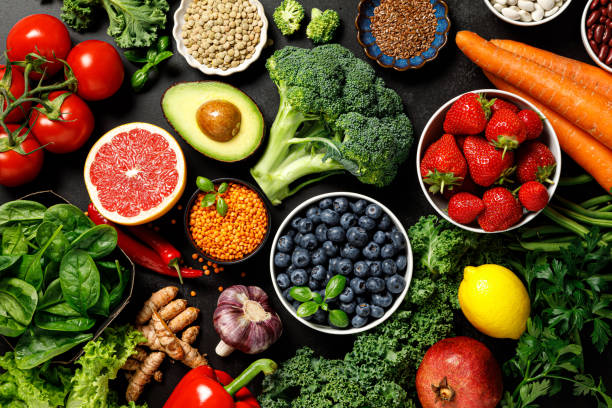Hidden Reasons Why You’re Struggling to Lose Weight (How to Fix It)

You’re eating the right foods, exercising, and trying everything under the sun to reach a healthy weight, but you don’t see results. No matter how hard you try, you’re struggling to lose weight. And it’s so frustrating!
What if I told you that losing weight isn’t just about calories in and calories out? But instead that your metabolism has a complex way of functioning and can be impacted by numerous factors.
So, if you’re constantly asking yourself, “Why am I struggling to lose weight despite trying so hard?” then let’s look into why this may be the case.
Hidden Reasons Why You’re Struggling to Lose Weight
-
Stressful Lifestyle
-
Environmental Toxin Exposure
-
Imbalanced Hormones
-
Underlying Inflammation
-
Hidden Food Sensitivities
-
Excess Sugar and Carbs
Stressful Lifestyle
What does your daily routine like? Do you bounce from one task on your to-do list to another? Do you allow yourself a chance to breathe, or are you constantly running around like a stressed-out wild woman (or what we would call the sympathetic fight-or-flight state)?
Unfortunately, this go, go, go lifestyle (that is accepted as normal in our society) is doing more harm to your body than you know. Here’s why:
When you’re stressed out, your body’s cortisol levels increase. This increase in cortisol signals to your liver to dump sugar into your bloodstream. Why? From an evolutionary standpoint, when our ancestors were stressed, it usually meant a predator was chasing them! They needed sugar in their bloodstream as the primary source of energy to run away for survival.
However, in today’s society, our stress is related to finances, overbooked schedules and keeping up with the Joneses. Not so much survival. Yet, our bodies still respond as if our survival was still in jeopardy. Sugar is still pumped into your bloodstream, and instead of it getting used up by running away, it gets shuttled to fat cells for storage. This is a huge driver behind belly fat and inflammation.
Environmental Toxin Exposures
New research suggests that environmental toxins are contributing to the obesity and diabetes epidemic. Pesticides and PCBs (toxins that come from industrial pollution and plastics) are stored in fat tissues and are released during weight loss. But the thing is, these toxins lower your metabolic rate, making it harder to lose that weight.
Environmental toxins can also reduce insulin production and interfere with insulin receptors, causing insulin resistance and weight gain.
Unfortunately, these harmful toxins are hidden in our everyday environment. While we can’t control every environment we are in, it’s helpful to know where these toxins are hidden to avoid them as best as possible. They are often found in household cleaners, plastic wrappings and containers, beauty products, food and water sources, and even your home air! Making your home a safe, less-toxic space is a great place to start.
Imbalanced Hormones
One major reason women struggle to lose weight is their hormones are out of balance. This could mean any of the following could be out of balance:
-
Thyroid: Hypothyroidism is commonly associated with weight gain because your thyroid hormones play a role in regulating your metabolism
-
Cortisol: Increased long-term cortisol levels are strongly related to abdominal obesity
-
Estrogen to Progesterone Ratio: weight gain can be a symptom of estrogen dominance
-
Blood Sugar Imbalance and Insulin: Too much insulin can make it harder to lose weight
If one is out of balance, it could cause a cascade of other imbalances in your body, slowing down your metabolism and leading to weight loss resistance.
Underlying Inflammation
Underlying inflammation could be caused by several factors including: poor diet, sedentary lifestyle, stress, infections and imbalances. Infections and imbalances could come in the form of heavy metals, parasites, high vital titers, mycotoxin exposure, gut issues and more.
When your body is dealing with constant stressors that are perceived as a threat, it releases proteins called cytokines. These proteins are pro-inflammatory, activating your body’s immune response and causing inflammation.
Cytokines also interfere with your body’s insulin response. Insulin regulates your body’s ability to metabolize the food you eat. If you’re insulin resistant, your body can’t properly metabolize foods, and it’ll be harder to lose weight.
Hidden Food Sensitivities
Most people are unaware of what food sensitivities even are. Unlike food allergies or intolerances, symptoms of food sensitivities can show up hours or even days later. Sometimes food sensitivities don’t manifest into physical symptoms that cause pain or discomfort, but they could still be wreaking havoc on your cells and bodily functions.
One major consequence of hidden food sensitivities is that they lead to inflammation. I can’t tell you how many people consume gluten or dairy and never have an “obvious reaction”, yet the second they cut them out of their diet and heal their gut, they drop excess weight.
Excess Sugar and Carbs
Oh, that love/hate relationship with carbs and sugar we all have! While it makes you feel happy and satisfied in the moment, it causes your blood sugar to drop later in the day, leading to mood swings and low energy.
When this happens, not only do you feel tired and less likely to want to go out and exercise, but you’re more likely to crave those carbs and sweets again, right? Unfortunately, this can lead you to overeat…and overeat unhealthy options, continuing a vicious cycle.
Focus on eating meals that have a healthy balance of proteins, healthy fats, and vegetables to keep your blood sugar balanced throughout the day and to help you feel full and satisfied until the next meal.
Try these tips if you’re struggling to lose weight
-
Take moments to pause throughout the day to just breathe. Right now, take a couple of long, deep breaths. Don’t you feel better already? Breathing can help reduce your stress, even on busy days.
-
Ditch the toxins. Read my article here about the damage hidden toxins can do to your health.
-
Buy organic foods to avoid pesticides.
-
Focus on eating as many whole foods as possible. This leaves less room for unhealthy processed foods!
-
Reduce inflammation in your body by reading my top daily detox tips for inflammation that I shared in a previous article, here.
-
If you are already eating clean, sleeping well, focusing on stress and not overexercising, it is time to look at other imbalances (mycotoxins, heavy metals, gut issues)
-
Ditch the oatmeal and yogurt. Instead, eat a well-balanced breakfast with clean protein.
-
Work with a Functional Medicine provider to uncover why you are experiencing weight loss resistance.
-
Utilize functional lab tests to check if your hormones, blood sugar and gut are balanced or to see if your body has a high toxin load, or if your insulin is a cause of alarm.
Get Your Gut Right
If you need access to a stool test, a gut health expert, and personalized protocols, the Get Your Gut Right program might be the right fit for you. This is a very comprehensive program that also focuses on nutrition, detox pathways, nervous system, clean environment, and more. Click HERE to learn more.
Stay Updated With Exciting News at Taylor Dukes Wellness!
We are always working on new ways to serve you on your health journey. Be the first to know about new offerings, health articles, and more by clicking here and filling out your information so we can be in touch.
Share This Post:
Your Wellness Deep Dive
- Be the first to learn about new healthy living resources, blog posts, and exclusive TDW offerings by getting on my insider list.
- Find healthy living products with ingredients you can trust – the same ones I personally use for myself and my family – in the TDW Shop. Check out our protein powders, electrolytes, supplements, and more!
- Get personalized support through the TDW Community. When you become a member, you get access to functional medicine expertise from me and my team, functional medicine lab testing and 1:1 consults, a digital library of exclusive wellness content, live monthly Q&As with me, and so much more!
YOU MAY ALSO LIKE:
Helping you get your gut right, improve energy, boost immunity, balance hormones, sleep better and look + feel your best
DISCLAIMER
PRIVACY POLICY
TERMS + CONDITIONS
ACCESSIBILITY
© 2025 Taylor Dukes Wellness
LEARN
SHOP
ABOUT
TDW Community
Free Guides
Blog
TDW Store
Fullscript
About Taylor
Press
Contact
COOKIE POLICY
SITE CREDIT
Trusted Products



